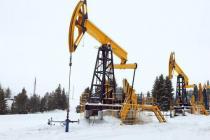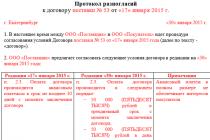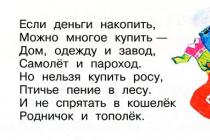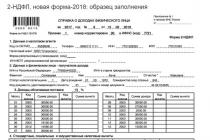As an object of state-legal influence, the economy is a complex and developing phenomenon. In the VII-III centuries. BC. in the life of mankind there has been a transition from an appropriating to a producing economy. For appropriating economy (hunting, fishing, collecting fruits of wild plants) is characterized by the fact that the producer is nature itself. Human consumption products are not produced, but mined. producing the economy meant a qualitative leap: with the advent of agriculture, cattle breeding, crafts, a person, or rather, his labor, is increasingly becoming a producer of consumer products, which gradually acquires the features of a defining element production process. Productive labor brought to life a new type of social relations - economic. In a productive economy, human labor is organically combined with the action of natural forces. The economy is a system of relations for the production, distribution, exchange and consumption of material goods. Cycle economic relations It starts with the production of material goods and ends with their consumption. Relations associated with the distribution and exchange of manufactured products are of an intermediate nature. The formation of economic relations gave rise to new institutional forms of their consolidation, stabilization, development. The state and law are socio-political institutions brought to life by the economy, the needs of its development and regulation. Law affects the economy, so to speak, from within, being the optimal form of the economy and the only possible form market economy and the state provides external conditions its functioning. First, the state performs the function of protecting the country from attack from outside and thereby protecting the economic space within the country. Secondly, it ensures the unity of society and its relative stability in conditions when society breaks up into classes and social strata with different, sometimes opposing interests. The internal unity and stability of society is also a necessary prerequisite for the normal functioning and development of the economy. Thirdly, the state also acts as a subject of economic relations, taking on some economic functions that ensure the integrity economic system countries. For example, since time immemorial, the state has taken care of money circulation, has a budget, finances education, culture, etc. Fourth, with complication in the course of historical development economic ties the state is increasingly involved in economic life in order to prevent the negative trends emerging in a market economy. Yes, in developed countries The West recognizes state regulation in the sphere of economy as useful and necessary. In this case, we are talking not just about the state, but about the state-legal impact on the economy using public law. The directions of such influence are diverse: the fight against monopoly; product quality control in terms of its safety for the life and health of consumers; compliance with environmental requirements in the production process, etc. When the impact of the state on the economy is excessive, it becomes negative, because it interferes with its free functioning and development. The extreme manifestation of such an impact is the nationalization of the economy, in which the state becomes the main owner of the means of production and takes over the management of the economy, the state “turns off” the operation of automatic mechanisms for coordinating the demand and supply of goods and services, the nationalization of the economy creates a lack of economic responsibility of enterprises, plants, factories , the excessive impact of the state on the economy is expressed in the excessive administrative regulation of economic relations. This infringes on economic freedom, leads to corruption of the state apparatus, to the emergence shadow economy.
The dominant position of the state in the economy gives it some advantages. The main one is the ability to very quickly and freely concentrate all the necessary resources (material, financial, labor) to solve individual problems. big problems: the production of weapons, the development of virgin lands, the construction of new cities, the maintenance of gigantic industrial construction projects, the implementation of space projects, etc. But the shadow side of such “achievements” is the decline standard of living population, lack of democracy, lack of rights of an individual, neglect of the environment, etc.
At the end of the 20th century, humanity faces the problem of how to organically combine the market economy, social policy and ecology. In a civilized society, the economy must be social and environmentally friendly. Such a transformation of the economy is possible only with the positive impact of the state and law on it in conditions where the highest value in society is the dignity and rights of a person and the rule of law is functioning.
State signs.
The concept of the state, its characteristics are concretized when revealing the features that distinguish it both from the tribal system and from non-governmental organizations of society. In other words, the analysis of the features of the state deepens knowledge about it, emphasizes its uniqueness as an irreplaceable form of organization of society and the most important socio-political institution.
1. Territorial organization of the population and the exercise of public authority within the territorial limits. In a pre-state society, the belonging of an individual to one or another genus was determined by blood or supposed kinship. Moreover, the clan often did not have a strictly defined territory, moved from one place to another. In a state-organized society, the kinship principle of organizing the population has lost its significance. It was replaced by the principle of its territorial organization. The state has a strictly localized territory, to which its sovereign power extends, and the population living on it turns into subjects or citizens of the state. Thus, the spatial limits of the state arise, in which a new legal institution appears - citizenship or citizenship.
With the territorial organization of the population, not only the emergence of the state is associated, but also the beginning of the folding individual countries. Therefore, from these positions, the concepts of “state” and “country” largely coincide.
The state differs from non-governmental organizations (trade unions, political parties, etc.) in that it represents the entire population of the country, extends its power to it. Trade unions and political parties unite in their ranks a part of the population, are created voluntarily for one or another interest.
2. Public (state) power. It is called public because, not coinciding with society, it speaks on its behalf, on behalf of the entire people.
Power also existed in pre-state society, but it was directly public power, which came from the whole family and was used by them for self-government. She did not need any officials or any apparatus. The principal feature of public (state) power is that it is embodied precisely in officials, i.e., in the professional class (category) of managers, from which the governing and coercive bodies (the state apparatus) are completed. Without this physical embodiment, state power is only a shadow, an imagination, an empty abstraction.
Personified in government bodies and institutions, public power becomes state power, that is, the real force that ensures state coercion, violence. The decisive role in the implementation of coercion belongs to groups of armed people and special institutions (army, police, prisons, etc.).
3. state sovereignty. The concept of "state sovereignty" appeared at the end of the Middle Ages, when it was necessary to separate the state power from the church and give it an exclusive, monopoly value. Today sovereignty is an obligatory feature of the state. A country that does not have it is a colony or a dominion.
Sovereignty as a property (attribute) of state power lies in its supremacy, autonomy and independence.
The supremacy of state power within the country means: a) the universality of its power, which extends to the entire population, all parties and public organizations given country; 6) its prerogatives (state power can cancel, recognize as null and void any manifestation of any other public power, if the latter violates the law); c) it has such means of influence that no other public authority has at its disposal (army, police or militia, prisons, etc.).
The autonomy and independence of state power from any other power within the country and outside it is expressed in its exclusive, monopoly right to freely decide all its affairs.
In the Soviet Union it was neither supreme, nor independent, nor independent, because above it was the power of the party. The state carried out party directives and was the executive instrument of the ruling party.
4. The inextricable link between the state and law. Without law, the state cannot exist. Law legally formalizes the state and state power and thereby makes them legitimate, i.e. legal. The state performs its functions in legal forms. Law introduces the functioning of the state and state power within the framework of legality, subordinates them to a specific legal regime. With such subordination of the state to law, a democratic legal state is formed.
The essence of the state.
The essence of the state is the meaning, the main thing, deep in it, which determines its content, purpose and functioning. So the main, fundamental in the state are power, its belonging, purpose and functioning in society. In other words, the question of the essence of the state is the question of who owns state power, who exercises it and in whose interests. That is why this issue is highly controversial.
Yes, supporters elite theory, which became widespread in the 20th century, they believe that the masses are not able to exercise power, manage public affairs, that state power should belong uncontrollably to the top of society - the elite until one ruling elite is replaced by another.
Adjacent to the theory of elites and in many respects consonant with it technocratic theory. According to representatives of this theory, professional managers and managers can and should rule and manage. Only they are able to determine the real needs of society, to find the best ways for its development.
The aforementioned theories are not without certain merits, but both of them suffer from anti-democratism and tear power away from the people.
Numerous adherents of various varieties democratic doctrine they proceed from the fact that the primary source and bearer of power is the people, that state power, by its nature and essence, must be truly popular, exercised in the interests and under the control of the people.
Marxist theory proves that political power belongs to the economically dominant class and is used in its interests. Hence, the class essence of the state is seen as a machine (instrument), through which the economically dominant class becomes politically dominant, exercising its dictatorship, that is, power, without limited by law and relying on force, on coercion.
The class approach in revealing the essence of the state is a major achievement of scientific social science. It was discovered and widely used by many scientists in different countries long before K. Marx. However, it is at least theoretically wrong to use this approach unconditionally to characterize all and every state.
Yes, the class character, the class orientation of the state's activity is its essential side, its main principle. But the activity of the state, due to class contradictions, is dominant only in non-democratic, dictatorial states, where there is a harsh exploitation of one part of society by another. But even in those cases when acute class conflicts arise, the state keeps classes from mutual destruction in a fruitless struggle, and society from destruction, thereby preserving its integrity. And under these conditions, it performs certain functions in the interests of the whole society.
In developed democratic countries, the state is gradually becoming an effective mechanism for overcoming social contradictions through not violence and suppression, but through the achievement of social compromise. The very existence of the state in our time is connected not so much with classes and the class struggle, but with general social needs and interests, which presupposes the reasonable cooperation of various, including conflicting forces. What has been said does not mean that modern state completely lost its class character, no, it simply faded into the background, ceased to dominate, and the general social side came to the fore. Such a state focuses its activities on ensuring social compromise, on managing the affairs of society.
In other words, in a democratic state, the second, but more significant than the first, is its general social side. Therefore, the analysis of the essence of the state requires taking into account both principles. Ignoring any of them will make the characterization of this entity one-sided.
The state and its essence, along with general social and class principles, are often strongly influenced by national and even nationalistic factors. Sometimes state power is in the hands of a narrow group, clan or individuals, expresses their interests, but such a power usually camouflages its interests, passes them off as general social and national ones.
With the emergence of the state, the sphere of its economic activity. The economic policy of the state becomes an integral part and a necessary element market system.
State intervention in the economy is objectively necessary for any government.
The main models of interaction between the state and the economy:
- command and distribution;
- market.
Command-distributive model of interaction between the state and the economy
In a distributive economy, the state assumes all responsibility for the production and distribution of goods and services.
The extreme manifestation of such an impact is the nationalization of the economy, in which the state becomes the main owner of the means of production and takes over the management of the economy.
Disadvantages of the distribution economy:
- The state "turns off" the operation of automatic mechanisms for coordinating the demand and supply of goods and services, i.e. interests of consumers and producers.
- The nationalization of the economy gives rise to a lack of economic responsibility of enterprises, plants, and factories.
- The excessive influence of the state on the economy is expressed in the excessive administrative regulation of economic relations.
Advantages of a distributive economy:
- The dominant position of the state in the economy gives it the opportunity to very quickly and freely concentrate all the necessary resources to solve certain major problems: the production of weapons, the development of virgin lands, the construction of new factories, which is necessary in emergency situations.
Market model of interaction between the state and the economy
In a market economy, the government is not faced with the task of directly organizing the production of goods and the distribution of resources. It does not have the right to freely dispose of resources, capital and produced goods, as is the case in a command-distributive economy.
The market system is primarily a prerogative in decision-making by producers and consumers.
The need for regulatory functions of the state is due to:
- The market mechanism cannot solve all problems economic growth (Already in the period of free competition, a significant part of the productive forces outgrows the classical framework and the state is forced to take on the maintenance of large economic structures: railways, mail, telegraph, etc.
- Strengthening interstate integration on the basis of the division of labor leads to the outgrowth of general economic processes beyond national borders, the formation of new socio-economic problems related to defense, science, regulation of social relations, reproduction of labor force, ecology, etc.
Historically, there have been two leading methodological approaches to regulating the market economy of developed countries:
- Keynesian school (theory state regulation economic mechanism) and
- a synthesis of neo-Keynesian, sometimes conservative, doctrines of state non-intervention in the economic life of society.
The differences between the concepts come down to the methods of state influence used, up to the complete denial of this influence. Thus, the Austrian economist Hayek noted that the state should only play the role of a "night watchman" (laissez-faire), not interfering in economic processes.
The state provides external conditions for the functioning of the economy.
The state protects the economic space within the country (from external intrusion).
The state ensures social stability in the country (the economy depends on it).
The state is also the subject of economic relations.
The state influences the economy through public law (the fight against monopoly).
When the state intervenes excessively in the economy, then:
The mechanism of supply and demand is turned off (since the state takes upon itself the definition of needs).
The economic responsibility of the entrepreneur is eliminated (the entrepreneur is not interested in the production of the product, since he will not "get" anything from the surplus, and will not lose anything if he does not fulfill the norm).
From the point of view of Marxism, the economy determines the state, and determines its type.
Law as a social institution arises together with the state, because in many respects they are designed to ensure the effectiveness of each other's actions. Just as the existence of a state is impossible without law (the latter organizes political power, often acts as a means of implementing the policy of a particular state), so is law without a state (which establishes, applies and guarantees legal norms). It is the state bodies that become the main structures that control the implementation of legal regulations and implement appropriate legal sanctions in case of their violation.
States cannot be embodied in any form that clearly contradicts their content and does not correspond to their economic basis. It is impossible to imagine a slave state in the form of a limited monarchy or a democratic republic with nationwide representative institutions.
The specific form of the state is predetermined by the historical type of the state. In addition, it depends on other factors, the determining one of which is the level economic development society.
If the law affects the economy as if from within, being the optimal form of the economy and the only possible form of a market economy, then the state provides the external conditions for its functioning. This is shown in the following.
First, the state performs the function of protecting the country from attack from outside and thereby protecting the economic space within the country.
Secondly, it ensures the unity of society and its relative stability in conditions when society breaks up into classes and social strata with different, sometimes opposing interests. The internal unity and stability of society is also a necessary prerequisite for the normal functioning and development of the economy.
Thirdly, the state also acts as a subject of economic relations, taking on some economic functions that ensure the integrity of the country's economic system. The state takes care of money circulation, has a budget, finances education, culture, etc. Using the example of Russia, one can observe what happens when the state ceases to perform these functions. law economic liberal policy
With the complication in the course of the historical development of economic relations, the state intervenes more and more actively in economic life in order to prevent negative trends that arise in the economy. In Western countries, state regulation in the economic sphere is recognized as useful and necessary.
To realize the need for state regulation of the economy, humanity had to go through a series of tough economic crises. The largest of these is, in particular, global crisis the US economy in 1933, which brought losses amounting to hundreds of millions of dollars. Crises of the 20s - 30s. 20th century fully outlined the need for social control of society over the economy, shed light on the inconsistency of the principle of non-intervention of the state in the economy and aimed at various measures of demonopolization of the economy through state regulation of the economy.
It's about not just about the state, but about the state-legal impact on the economy using public law. The directions of such influence are diverse: the fight against monopoly; product quality control in terms of its safety for the life and health of consumers; compliance with environmental requirements in the production process, etc.
When the impact of the state on the economy is excessive, it becomes negative, because it interferes with its free functioning and development. The extreme manifestation of such an impact is the nationalization of the economy, in which the state becomes the main owner of the means of production and takes over the management of the economy, as it was in the USSR. The fallacy of such a system is as follows.
First, the state "turns off" the operation of automatic mechanisms for coordinating the demand and supply of goods and services, i.e. interests of consumers and producers. In a market system, the entrepreneur produces what the consumer needs. Otherwise, he will be ruined. In other words, the consumer dictates what and how much to produce. The state-owner takes this function for itself, carrying out production planning. The opinion of government officials about what society needs, the consumer, becomes decisive for the manufacturer. The collective mind of officials of the state apparatus, which does not correspond to the collective desire of consumers, generates disproportions in the public economy, i.e. the production of unnecessary products and the shortage of what is needed.
Secondly, the nationalization of the economy gives rise to a lack of economic responsibility of enterprises, plants, and factories. Economic results they are not of particular importance, because the state takes profits from profitable enterprises, and provides the necessary financing to unprofitable ones. No company can go bankrupt. Only the state as a whole can go bankrupt. However, if the country is rich natural resources, it is not so easy to get to this point.
The state is an organization that performs useful functions that society cannot do without. Their costs are normal. public services. But the state, using its power, can impose an excessive tribute on society, and then the costs become a heavy burden on the economy and hinder its development. The most typical excessive costs are the militarization of the economy, the maintenance of a huge army, a large apparatus of officials, and so on.
Exorbitant indicators public spending are straight and indirect taxes robbing the population and choking the economy, rapid inflation and other negative phenomena. In today's Russia, taxes are often confiscatory in nature. In order to survive in these conditions, manufacturers are forced to look for legal and illegal ways to avoid taxes.
Realizing this, in 2006 the Russian legislation planned the creation of 10 special economic zones of two types with a validity period of 20 years: industrial production (with an area of no more than 20 square kilometers for assembly plants) and technical innovation (with an area of no more than 2 km sq. for the creation and commercialization of scientific developments). For these zones, the unified social tax up to 14%. Customs privileges are provided.
The purpose of special economic zones is to create favorable conditions for business development. It should be noted that in the mid-90s of the XX century, 11 free economic zones were already created on the territory of Russia. In practice, they were turned into offshore companies, where, thanks to preferential taxation"laundered" money.
Creation of a special economic zone(industrial and production zone "Kazinka") on the territory of the Lipetsk region in terms of significance and scale of its governor Korolev O.P. compared with the historic decision to build the Novolipetsk Iron and Steel Works, which was paramount in the 30s of the 20th century for the whole country. The successful implementation of this project will make it possible to place production facilities worth at least 200 billion rubles in it. From 15 to 20 large factories will be able to operate on this territory. More than 50 residents are expected to participate, including the largest companies in the USA, Germany, France, Canada and Austria. 12-13 thousand new jobs will be created. The implementation of this project will attract more than 21.5 billion rubles. investment in the region's economy. Issues of socio-economic development of the region will be solved more effectively.
Thirdly, the excessive influence of the state on the economy is expressed in the excessive administrative regulation of economic relations. This infringes on economic freedom, leads to corruption of the state apparatus, to the emergence of a shadow economy.
The dominant position of the state in the economy gives it some advantages. The main one is the ability to very quickly and freely concentrate all the necessary resources (material, financial, labor) to solve certain major problems: the production of weapons, the development of virgin lands, the construction of new cities, the maintenance of giant industrial construction projects, the implementation of space projects, etc. But the shadow side of such "achievements" is the decline in the living standards of the population, the lack of democracy, the lack of rights of the individual, the neglect of the environment, etc.
One of the central and most persistent debatable issues economic theory and economic policy continues to be the question of the role of the state in stimulating economic relations. Dominant views on this big practical value for the development of any society the problem has changed repeatedly. Accordingly, the strategy has undergone radical changes. developing countries.
For example, Japanese scholars economic miracle distinguish four phases of Japanese industrial policy: restoration of domestic production (50s); rapid increase in export products (60s); development of high-tech industries (70s); development of innovative processes (80s). According to a similar scenario, they built economic policy and other states: South Korea, Taiwan, Spain, France.
The successful solution of sequentially arranged tasks made it possible to increase the Japanese GDP per capita from 20% (1950) in relation to the American indicator to 66% by the mid-1980s of the XX century. Today's Russian per capita GDP in relation to the US is about 25%.
The results of the researchers' economic calculations based on data on more than 100 countries over a period of 25 years indicate the following. To ensure the rapid growth of the economy, the state must follow a very complex strategy, constantly choosing a policy that is adequate to the stage of modernization. Timely change it when moving from one stage to another.
Not all states managed to successfully solve the set tasks. For developing countries, the most typical errors were: the error of inertia and the error of premature transition to the next stage. Russia, according to experts, also makes mistakes. Having not fully solved the tasks of the first and second stages, it is already striving to pursue an economic policy characteristic of the third and fourth stages.
Cluster policy is becoming a very common instrument of the state to increase its competitiveness in various industries. Its author is Michael Porter, professor at Harvard Business School. The cluster is a group of geographically localized interconnected companies - suppliers of equipment, components, specialized services, infrastructure, research institutes, universities and other structures designed to complement each other and enhance the competitive advantages of both individual companies and the cluster as a whole. For example, in the US economy, 32% of employment is provided by clusters, and in Sweden - 39%.
Cluster policy in a single country depends on the specifics of the economic policy pursued by the state. Liberal cluster policy is typical for countries pursuing a liberal economic policy, giving preference to the market (USA, UK, Australia, Canada). The dirigiste cluster policy is typical for countries where public authorities play an active role in regulating economic processes (France, Korea, Singapore, Japan, Sweden, Finland, Slovenia). Clusters can also develop at the initiative of regional authorities. This is already observed in the examples of the constituent entities of the Russian Federation.
The principal differences between liberal and dirigiste cluster policies are as follows:
- 1. In setting priorities, conductors at the state level choose sectoral and regional priorities and those clusters that they intend to develop. Liberal ones are limited to the development of those clusters that are formed by the market.
- 2. Conductors deliberately create infrastructure for priority clusters, while liberals rarely participate in this process.
- 3. Conductors independently choose a region to create a cluster, and also determine the amount of its funding. The liberals are creating a system of incentives for the interest of the regional authorities, who are fully responsible for the effectiveness of the cluster being created.
Features of the development of clusters in the economy modern Russia is limited financial resources regions; administrative restrictions from federal bodies state power; geographic scope of the country.
If the law affects the economy from within, being the optimal form of a market economy, then the state provides the external conditions for its functioning.
First, the state performs the function of protecting the country from attack from outside and thereby protecting the economic space within the country.
Secondly, it ensures the unity of society and its relative stability in conditions when society breaks up into classes and social strata with different interests. Internally, the unity and stability of society is also a necessary prerequisite for the normal functioning and development of the economy.
Thirdly, the state also acts as a subject of economic relations, taking on some economic functions that ensure the integrity of the country's economic system (for example, the state budget).
Fourthly, with the complication in the course of the historical development of economic relations, the state intervenes more and more actively in economic life in order to prevent the negative trends that arise in a market economy. When the influence of the state on the economy is excessive, it becomes negative, because. hinders its free functioning and development. The extreme manifestation of such an impact is the nationalization of the economy, in which the state becomes the main owner of the means of production and takes over the management of the economy. The strength of such a system is as follows:
1. The state “turns off” the operation of automatic mechanisms for coordinating the demand and supply of goods and services, i.e. interests of consumers and producers. In a market system, the entrepreneur produces what the consumer needs.
2. The nationalization of the economy gives rise to the absence of economic responsibility of enterprises, plants, factories.
3. Excessive influence of the state on the economy is expressed in excessive administrative regulation of economic relations. This infringes on economic freedom, leads to corruption of the state apparatus, to the emergence of a shadow economy. The dominant position of the state in the economy gives it some advantages. The main one is the ability to very quickly and freely concentrate all the necessary resources to solve certain major problems: the production of weapons, the development of virgin lands ... but the shadow side of such an achievement is the decline in the living standards of the population, the lack of democracy.
State signs.
It is necessary to consider in relation to each aspect of the concept of "state"
1. State - special apparatus of public authority: 1) professional managers not involved in the process material production. 2) a special apparatus of coercion: the army, the police. 3) state sovereignty. The supremacy of roc power within the territory of the country. 4) legislation - a system of legal acts issued by the state. apparatus. With their help, Mr. the apparatus exercises its power.
2. State - special shape organizations human society, replacing the original organization. 1) special public authority. 2) the territorial principle of the organization of the population and authorities. 3) tax system. Taxes - material good, which in without fail levied on the population in order to support the state. apparatus. 4) law - a special regulator of human behavior, embodied in the system. Legal norms and principles in PS and software. 5) popular sovereignty. - an inalienable top, the right of the people to demand from the state. apparatus for the realization of the interests of the people.
3. State - a country. All the previous signs + 6) the presence of its own territory. 7) a special political and legal relationship between the state and the population citizenship, citizenship
The essence of the state.
The essence is considered at different levels in relation to the aspects of understanding the state. The result of the interaction of general social and group purposes.
The essence of the 1st order of the state at the state level. apparatus - the state is a body functioning on professional basis and having the ability to monopolize the use of legitimist violence for the implementation of social. management based on the coordination of general social and group interests.
The essence of the 2nd order of the state as an organization of society: the state is the only possible, comprehensive form of existence of a socially heterogeneous society that ensures progressive development.
The essence of the 3rd order of the state as a specific country: a form of existence of economically and politically isolated parts of humanity, allowing these parts to maintain their national, cultural independence, political independence.
This is the only possible, universal form of organization of a socially heterogeneous society, which allows the economically and politically isolated parts of humanity to maintain their national, cultural independence, political independence, and also ensures their progressive development.
function of the state.
Stable directions of the state. activities in which the essence of the state is manifested. As the essence changes, the functions of the state also change.
Signs: 1) the functions of the state are aimed at solving large-scale tasks facing the state at each specific stage of its development. 2) these are the most stable areas of state activity. 3) the implementation of the functions of the state is associated with the use of special, including coercive methods, means. 4) not any directions, but only decisive ones, without which the state does not exist in principle. The value of the functions is not the same, it depends on: 1.econ. conditions in which the state exists, 2. Geographer, natural factors. Depending on the stage of development, some functions may become predominant, while others may not.
Kinds: 1. according to the duration of their implementation: a) permanent, b) temporary. 2. By territory, per cat. they are implemented: a) external, b) internal. 3. By areas of general. lives to which they apply: a) economic., b) political., c) ideological, d) social. 4. according to the form of their implementation: a) they are implemented in a legal form, b) in a non-legal one. 5. According to the nature of the interests expressed in the functions: a) general social, b) class.
If law affects the economy from within, being the optimal form of a market economy, then the state provides the external conditions for its functioning.
First of all, the state performs the function of protecting the country from attack from outside and thereby protecting the economic space within the country.
Secondly, it ensures the unity of society and its relative stability in conditions when society breaks up into classes and social strata with different, sometimes opposing interests. The internal unity and stability of society is also a necessary prerequisite for the normal functioning and development of the economy.
Thirdly, the state also acts as a subject of economic relations, taking on some economic functions, ensures the integrity of the country's economic system (for example, the state budget).
Fourth, with the complication in the course of the historical development of economic relations, the state intervenes more and more actively in economic life in order to prevent the negative trends that arise in a market economy.
When the impact of the state on the economy is excessive, it becomes negative, because it interferes with its free functioning and development. The extreme manifestation of such an impact is the nationalization of the economy, in which the state becomes the main owner of the means of production and takes over the management of the economy. The fallacy of such a system is as follows:
First of all, the state “turns off” the operation of automatic mechanisms for coordinating the demand and supply of goods and services, i.e. interests of consumers and producers. In a market system, the entrepreneur produces what the consumer needs.
Secondly, the nationalization of the economy gives rise to the absence of economic responsibility of enterprises, plants, factories (no enterprise can go bankrupt, only the state). The state is an organization that only spends without producing anything.
Thirdly, the excessive impact of the state on the economy is expressed in the excessive administrative regulation of economic relations. This infringes on economic freedom, leads to corruption of the state apparatus, to the emergence of a shadow economy.
The dominant position of the state in the economy gives it some advantages. The main one is the ability to very quickly and unhinderedly concentrate all the necessary resources to solve certain major problems: the production of weapons, the development of virgin lands ... But the shadow side of such “achievements” is the decline in the living standards of the population, the lack of democracy, the lack of rights of an individual ...
State signs.
The concept of the state, its characteristics are concretized when revealing the features that distinguish it both from the tribal system and from non-governmental organizations of society.
Prof. Korelsky identifies 4 main features:
1. Territorial organization of the population and the exercise of public authority within the territorial limits. In a state-organized society, the kinship principle (in a pre-state society) of organizing the population has lost its significance. Replaced by a territorial organization. The state has a strictly localized territory, on which its sovereign power is distributed, and the population living on it turns into subjects or citizens of the state. The state differs from non-state organizations (trade unions, political parties) in that it embodies the entire population of the country, spreads its power over it. Trade unions and political parties unite in their ranks a part of the population, are created voluntarily for one or another interest.
2. Public (state) power. It is called public because it does not coincide with society, it speaks on its behalf, on behalf of the entire people. The fundamental feature of public authority is that it is embodied precisely in officials, i.e. in the professional composition of the rulers, of which the governing and coercive bodies are completed (the state apparatus). Embodied in state bodies and institutions, public authority becomes state authority, i.e. the real force that provides state coercion, violence.
3. state sovereignty. A country that does not have it is a colony or dominion. Sovereignty as a property (attribute) of state power lies in its supremacy, autonomy and independence.
The supremacy of state power within the country means: a) the universality of its powerful power, which is distributed to the entire population, all parties and public organizations; b) its prerogatives (state power can cancel any manifestation of any other public power if the latter violates the law); c) it has such means of influence that no other public authority has at its disposal (army, police, prisons).
The autonomy and independence of state power from any other power within the country and outside it is expressed in its exclusive, monopoly right to freely decide all its affairs.
4. The inextricable link between the state and law. Without law, the state cannot exist. Law legally formalizes the state and state power and thereby makes them legitimate, i.e. legal. The state performs its functions in legal forms. Law introduces the functioning of the state and state power within the framework of legality, subordinating them to a specific legal regime. With such subordination to law, a democratic legal state is formed.
The essence of the state.
The essence of the state- meaning, most importantly, deep in it, which determines its content, purpose and functioning. Such a main, fundamental in the state is power , its belonging, purpose and functioning in society. In other words, the question of the essence of the state is the question of who owns state power, who exercises it and in whose interests.
Elite theory - the masses of the people are not capable of exercising power, managing public affairs, state power must belong to the top of society - the elite until one ruling elite is replaced by another.
Technocratic theory - to dominate, govern can and must professional managers, managers. Only they are able to determine the real needs of society, to find the best ways of its development.
Democratic doctrine - the primary source and bearer of power is the people, state power by its nature and essence must be truly popular, exercised in the interests and under the control of the people.
Marxist theory - political power belongs to the economically dominant class and is used in its interests. Hence the class essence of the state as a machine (instrument), through which the economically dominant class becomes the politically dominant, exercises its dictatorship, i.e. power is not limited by law and relies on force, on coercion. Used this approach to characterize the various states is theoretically incorrect. The class character is the essential side of the state, its main principle. But the activity of the state, due to class contradictions, is dominant only in non-democratic, dictatorial states, where there is a harsh exploitation of one part of society by another. In developed democratic countries, the state is gradually becoming an effective mechanism for overcoming social contradictions through not violence, but the achievement of social compromise. In other words, in a democratic state, the second, but more significant than the first, is the general social aspect. Consequently, the analysis of the essence of the state requires taking into account both principles (class and general social). Ignoring any of them will make the characterization of this entity one-sided.
The essence of the state lies in the fact that it is such a form of organization of public authority in a socially differentiated (heterogeneous) society that provides social management on the basis of harmonization and coordination of the interests of various groups and strata of the population. But its essence as a means of consent and social compromise was not always so clear and bold.














